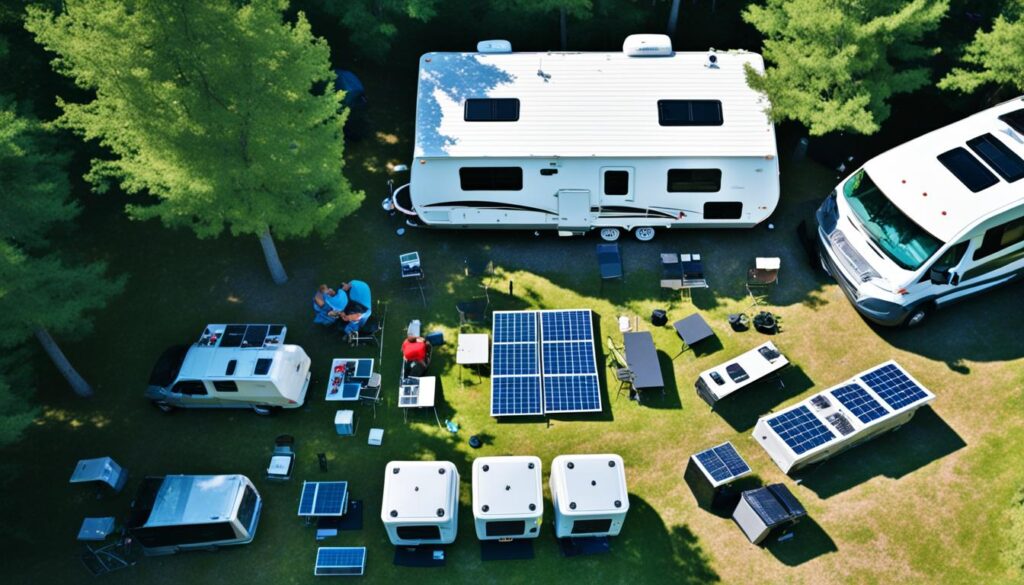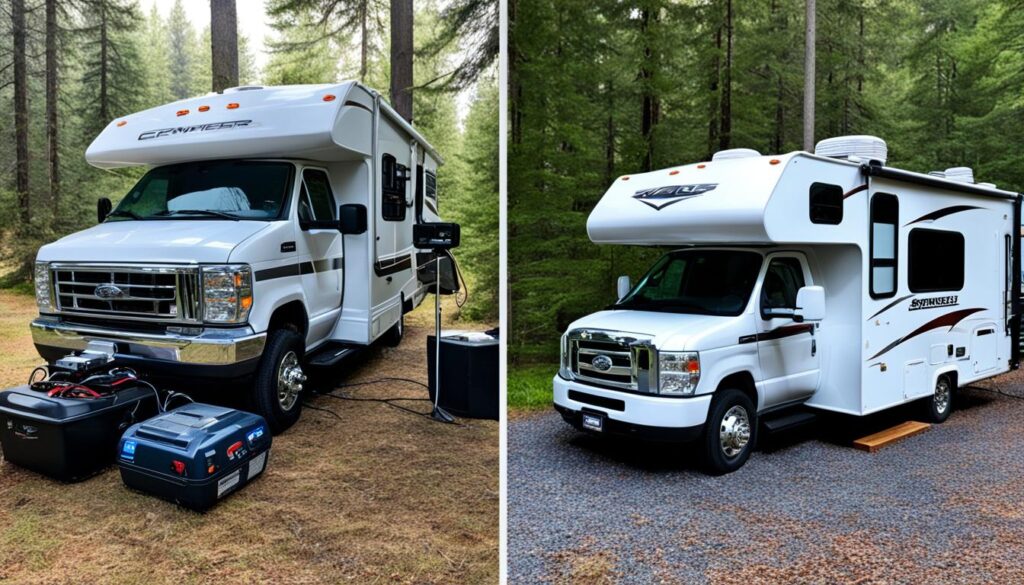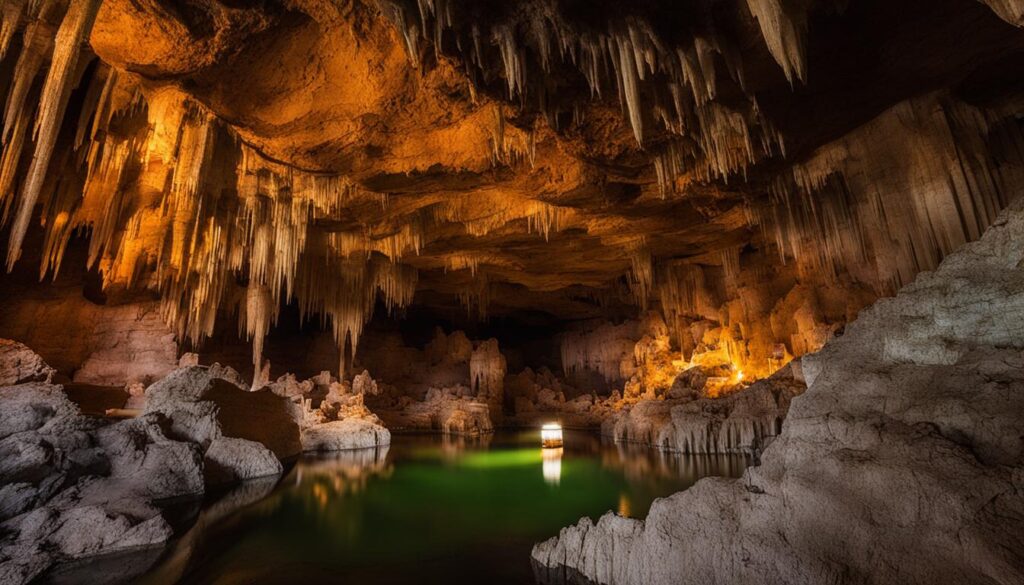Are you planning a camping trip in your RV and wondering what size generator you need? It’s a common question that many campers grapple with. Choosing the right generator size for your camper is crucial to ensure you have enough power to run all your appliances and devices while enjoying the great outdoors. But how do you determine the ideal generator capacity for your camper? Let’s explore the factors you need to consider and find the answer to this important question.
Key Takeaways:
- Factors such as the type of appliances and devices, usage patterns, and power requirements play a crucial role in determining the size of the generator you need for your camper.
- There are two main types of generators for RVs: portable and built-in. Portable generators are lightweight and easy to move around, while built-in generators are installed in larger RVs and offer more power.
- Calculating your power needs involves assessing the required power of each device, considering your usage pattern, and determining the starting and running power of your appliances.
- Once you have calculated your total wattage requirements, you can choose the right generator size for your camper. Consider the type of RV you have and the power needs of your appliances.
- Solar generators and propane generators are two popular options for RVs. Solar generators are renewable and eco-friendly, while propane generators are fuel-efficient and cost-effective.
Contents
Types of Generators for RVs: Portable vs Built-In
When it comes to generators for RVs, there are two main types to consider: portable generators and built-in generators. Each type offers its own advantages and considerations, catering to different camping needs and preferences.
Portable Generators
Portable generators are a popular choice for RV owners who want the flexibility of additional backup power. These generators are lightweight, compact, and easy to move around, making them highly convenient for camping trips. Portable generators come in a range of capacities, from 288Wh to 3600Wh, providing ample power for various appliances and devices.
One of the key benefits of portable generators is their expandability. They can be enhanced by adding extra batteries or linking multiple portable power stations, allowing for increased power storage and prolonged usage. This versatility makes them an excellent choice for RVers who require more power for extended trips.
Furthermore, portable generators can be powered by various fuel sources, including gas, diesel, propane, and even solar energy. This flexibility provides campers with different options based on their preferences and available resources. It’s worth noting that portable generators may produce more noise compared to built-in generators; however, many portable models come with noise-reducing technologies to mitigate this issue.
Built-In Generators
Built-in generators, also known as stationary generators, are typically installed in larger RVs and offer greater power output compared to portable generators. Ranging from 3,000 to 12,000 watts, these generators are wired into the RV’s electrical system and utilize the RV’s batteries as a fuel source.
The advantage of built-in generators is that they are designed to provide backup power or directly power the RV. They are seamlessly integrated into the RV’s design and electrical system, eliminating the need for external fuel storage or frequent refueling. Built-in generators can be powered by different fuel types, including gas, diesel, propane, and some models can even harness solar energy.
Compared to portable generators, built-in generators are generally quieter, as they are specifically designed to operate within the RV. This ensures a more comfortable camping experience, without the excessive noise generated by external units.
Comparison of Portable Generators and Built-In Generators
| Portable Generators | Built-In Generators |
|---|---|
| Lightweight and portable | Seamlessly integrated into the RV |
| Range of capacities: 288Wh to 3600Wh | Higher power output: 3,000 to 12,000 watts |
| Expandable with extra batteries or multiple power stations | Operates using RV’s batteries as a fuel source |
| Powered by gas, diesel, propane, or solar energy | Powered by gas, diesel, propane, or solar energy |
| May produce more noise | Generally quieter |
As you can see, both portable and built-in generators for RVs offer unique benefits and considerations. The choice between the two ultimately depends on your specific camping needs, power requirements, and preferences.
Calculating Power Needs for Your Camper
When it comes to powering your camper, it’s crucial to accurately calculate your power needs. By estimating the wattage requirements of your appliances and devices, you can ensure that you have the right generator size for your camping adventures.
Assessing Power Requirements
Start by assessing the power requirements of each appliance and device you plan to use in your camper. Check the amps (A) or watts (W) requirements of each item to estimate its power consumption. Keep in mind that high-powered devices like microwaves or hair dryers will require a higher-capacity generator.
Consider Usage Pattern
Next, consider your usage pattern. Are you camping with access to utilities, or are you boondocking in the middle of nowhere? The answers to these questions will impact your energy usage. If you have access to utilities, you may rely less on your generator. However, if you’re boondocking, you’ll need to ensure your generator can meet your power needs independently.
Determine Starting and Running Power
To accurately estimate your power needs, determine the starting and running power for your appliances and devices. Starting power refers to the electricity required to start up an item, while running power is the power needed to maintain continuous operation. Keep in mind that appliances like air conditioners and heaters typically have higher starting power than running power.
By considering these factors, you’ll be able to estimate the total wattage requirements for your camper. This estimation will guide you in choosing the right generator size to meet your power demands.

| Appliance/Device | Starting Power (W) | Running Power (W) |
|---|---|---|
| Air Conditioner | 1500 – 3500 | 1200 – 3000 |
| Refrigerator | 800 – 1200 | 100 – 400 |
| Microwave | 1000 – 1500 | 1000 – 1500 |
| Coffee Maker | 800 – 1200 | 800 – 1200 |
Here’s an example of the starting and running power requirements for common appliances and devices in a camper. Use this as a reference point when estimating your own wattage requirements.
Choosing the Right Generator Size for Your Camper
Now that you have calculated your total wattage requirements, it’s time to determine the optimal generator size for your camper. Portable generators are a popular choice for providing backup power, and they come in various capacities to suit different needs. A 2,500-watt generator is suitable for powering smaller appliances and devices, while a 4,000-watt generator can provide the additional wattage necessary for larger appliances like air conditioners.
On the other hand, if you have a larger RV, built-in generators ranging from 3,000 to 12,000 watts are more suitable. These generators are designed specifically for larger RVs and can handle the power needs of multiple appliances at once. When choosing the right generator size for your camper, take into account factors such as the type of RV you have (30-amp or 50-amp), the voltage and amp rating of your RV’s electrical system, and the power needs of your appliances and devices.
Tip: A 30-amp RV typically requires a generator with a minimum capacity of 3,600 watts, while a 50-amp RV may require a larger capacity generator, depending on the number and power needs of the appliances.
It’s crucial to choose a generator that can handle your camper’s power requirements to ensure a reliable source of electricity during your travels. Undersizing your generator may result in insufficient power supply, while oversizing can be wasteful and lead to unnecessary expenses. Consider your specific needs and the power demands of your appliances to find the optimal generator size for your camper.

Solar Generators vs Propane Generators
When it comes to RV generators, two popular options are solar generators and propane generators. Solar generators harness the power of the sun to generate electricity, making them a renewable and eco-friendly choice. They use solar panels to convert sunlight into usable energy, providing a clean and sustainable power source for your camper.
Solar generators offer several benefits for RV enthusiasts. First, they are generally quieter than propane generators, creating a peaceful camping experience without the noise pollution. Second, solar generators are more dependable during power outages, as they rely on sunlight rather than fuel availability. This ensures that you have a consistent power supply, even in remote areas.
Using solar energy for your RV can bring a multitude of advantages such as a renewable power source, quiet operation, and independence from fuel availability.
Additionally, solar generators can be used in conjunction with a battery management system. This allows you to store excess energy produced during the day and use it at night or during cloudy weather, providing electricity indefinitely without relying solely on sunlight. This flexibility ensures that you always have access to power whenever you need it.
On the other hand, propane generators are typically cheaper than solar generators and are ideal for areas without access to solar power. They use propane fuel, which is readily available and easy to store. Propane generators are fuel-efficient and can provide reliable power for your camper.
However, there are a few considerations to keep in mind when choosing a propane generator. Propane generators tend to be louder than their solar counterparts, which may be a downside if you prefer a quieter camping experience. Additionally, propane generators require regular fuel refills and maintenance to ensure proper functioning.
In summary, the choice between solar generators and propane generators depends on your specific needs and preferences. Solar generators offer the benefits of renewable energy, quiet operation, and independence from fuel availability. Propane generators, on the other hand, are cost-effective and suitable for areas without access to solar power. Consider your camping style and power requirements to make an informed decision.
Jackery Solar Generators: The Quiet RV Generator
When it comes to reliable RV solar generators, Jackery is a brand that stands out. They offer a range of solar generators that are specifically designed for RV use, providing a quiet and eco-friendly power solution for your camping adventures.
One of their popular models is the Jackery Solar Generator 2000 Pro, equipped with SolarSaga 200W solar panels. This powerful generator is large enough to power air conditioners, refrigerators, and other appliances for hours, ensuring you have all the necessary comforts while on the road. For smaller electrical devices, the Solar Generator 1000 Pro with SolarSaga 80W or 200W solar panels is a suitable choice.
What sets Jackery solar generators apart is their fast and full-charging times. With their efficient solar panels, you can quickly recharge the generator and have a reliable power source whenever you need it. Installation and usage are hassle-free, allowing you to focus on enjoying your outdoor experience without worrying about power limitations. Investing in a Jackery solar generator can greatly enhance your camping trip, providing you with the necessary power for a comfortable and enjoyable journey.
FAQ
How do I determine the right generator size for my camper?
To determine the right generator size for your camper, consider factors such as the power requirements of your appliances and devices, the usage pattern of those appliances, and the starting and running power requirements. Calculate the total wattage requirements for your camper by estimating the watt-hours for each device and adding them up.
What types of generators are available for RVs?
There are two main types of generators for RVs: portable generators and built-in generators. Portable generators are lightweight, compact, and easy to move around. They come in various capacities and can be expanded using additional batteries. Built-in generators are pre-installed in larger RVs and offer more power. They are wired into the RV’s electrical system and use the RV’s batteries as a fuel source.
How can I calculate the power needs for my camper?
To calculate the power needs for your camper, assess the power requirements of your appliances and devices, consider the usage pattern of those appliances, and determine the starting and running power for each item. High-powered devices like microwaves or hair dryers will require a higher-capacity generator. By considering these factors, you can estimate the total wattage requirements for your camper.
How do I choose the right generator size for my camper?
To choose the right generator size for your camper, consider the type of RV you have (30-amp or 50-amp), the voltage and amp rating of your RV’s electrical system, and the power needs of your appliances and devices. A 30-amp RV typically requires a generator with a minimum capacity of 3,600 watts, while a 50-amp RV may require a larger capacity generator, depending on the number and power needs of the appliances.
What are the benefits of solar generators for RVs?
Solar generators are a renewable and eco-friendly option for RVs. They use solar panels to generate electricity, making them a clean and quiet power source. Solar generators are generally more dependable during power outages and can be used with a battery management system to provide electricity indefinitely.
What are the benefits of propane generators for RVs?
Propane generators are typically cheaper than solar generators and can be used in areas without access to solar power. They are fuel-efficient and can be used in conjunction with solar energy systems for additional power. However, propane generators are louder and require more maintenance than solar generators.
What are the benefits of Jackery solar generators for RVs?
Jackery solar generators are specifically designed for RV use and provide a reliable and quiet power source. They offer fast and full-charging times, ensuring you have reliable power while enjoying the outdoors. Jackery solar generators are easy to install and use, providing a renewable power source for your RV.






